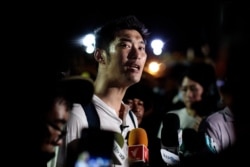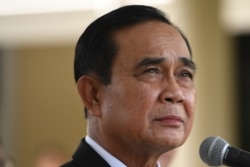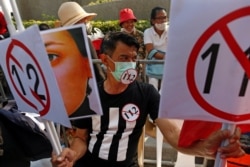In Thailand, a group of ex-lawmakers shut out of national politics by a controversial court order is taking its reform agenda to the provinces by backing like-minded candidates in local elections long dominated by entrenched family networks.
Thailand is holding elections to fill its Provincial Administrative Organizations (PAOs) on Dec. 20 for the first time since 2012, having put off local polls after a 2014 coup that brought on five years of military rule.
Under the banner of their Progressive Movement, the former lawmakers are campaigning hard for hundreds of candidates with the same broad pro-democracy goals that have been galvanizing the student-led protests roiling Bangkok for the past few months.
"By competing in the local politics, we have the opportunity to [say] to the people that if we want a democratic Thailand, building a democratic local political base is very important," the Movement's co-founder, Thanathorn Juangroongruangkit, told VOA at the end of a busy day of campaigning late last week.
'The same ideals'
National elections for parliament last year nominally returned Thailand to civilian rule. Yet many Thais believe the contest was rigged. Following the election's inconclusive results, coup leader Prayut Chan-ocha won a parliamentary vote for prime minister thanks to new rules his junta wrote into the constitution and the ballots of a junta-appointed Senate.
The same elections also saw the new Future Forward party, led by Thanathorn, finish a strong third on a progressive platform that struck a chord with younger voters. The party pushed for constitutional amendments what would have rolled back the military's political privileges and opposed moves to expand the powers of King Maha Vajiralongkorn.
But the party's time in parliament proved short-lived. Barraged with lawsuits, it was finally brought down in February over a pair of loans the Constitutional Court deemed illegal. The court promptly ordered the party dissolved and its executives barred from public office for the next 10 years. Future Forward called the case a hoax, and its prosecution set in motion the wave of protests now filling Bangkok's streets.
The protests have taken on a life of their own since coalescing around Future Forward a year ago. A new batch of young activists independent of the former party has taken the reins. Demands for Prayut to step down and stronger checks on the king are now front and center.
But the protesters and the Progressive Movement are still riding the same sweeping reformist current, said Titipol Phakdeewanich, dean of the political science faculty at Ubon Ratchathani University.
"They have the same ideology ... to make Thailand more liberal and more democratic," he said. "They also have the same feeling that they want Thailand to change, to be a more liberal country, liberal society."
They may be tackling that goal at different levels of Thai politics, Thanathorn said, but "we share the same ideals."
"Local politics in Thailand has been dominated by local political dynasties for too much and for too long," he said. "If we want to see democracy at the national level, I believe it is crucial we build it from the bottom up."
To that end, the Progressive Movement is backing candidates for PAO chief in 42 of Thailand's 76 provinces and about 800 other hopefuls running for the roughly 1,900 PAO council seats also up for grabs.
'A patronage system'
Set up in the 1990s to give local communities more say in government, PAOs decide how to spend a share of Thailand's tax proceeds in each province, mostly on public services from roads and schools to parks and markets. Combined, they dole out about $2.7 billion a year.
But pundits say many PAOs have been all but captured by politically connected family clans that win election after election by handing out jobs and contracts and other benefits while corralling votes for national parties.
"It's kind of a patronage system," and one with national implications, said Punchada Sirivunnabood, an associate professor of politics at Thailand's Mahidol University.
"If the national politicians want to win the elections, they need to ask for support from the local politicians," she said, and "everyone knows which family controls which province."
The Progressive Movement wants to upend that system by injecting more competition into each race with new candidates and by putting policy before patronage.
Thanathorn said that patronage system often pours money into projects that don't deliver. He wants to make PAOs more accountable by opening the books on how much money they spend on what and by finding new ways of giving locals a say in how that money gets spent.
Winning won't be easy. Punchada said the Progressive Movement may manage to pick up votes in some urban areas, where populations skew younger, but will struggle to convince most rural voters to break ties with deep-rooted incumbents.
Titipol also doubts the Movement can carry over the success its progenitor, Future Forward, saw in last year's national elections. While most of the other major parties that ran won the majority of their parliamentary seats by winning individual constituencies, Future Forward won most of its seats among those apportioned by the total share of votes parties won nationwide. Titipol said the PAO elections are all first-past-the-post races.
The Progressive Movement will also have to make it to election day.
Thailand's Election Commission is investigating a complaint that the Movement is in effect a political party even though it is not registered as such and claims to not be one. Election laws bar political parties from openly supporting PAO candidates, though analysts say many are well known to be connected informally.
The Movement says it is doing nothing wrong. But if convicted by a court, Thanathorn and other Movement leaders could be fined or jailed and see their candidates disqualified.







